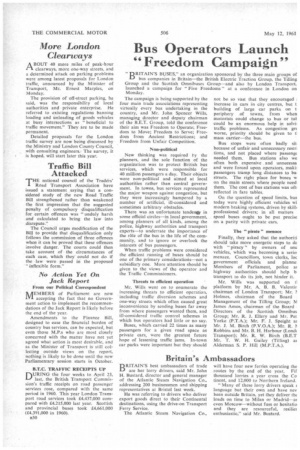Bus Operators Launch "Freedom Campaign"
Page 34

If you've noticed an error in this article please click here to report it so we can fix it.
" BRITAIN'S BUSES," an organization sponsored by the three main groups of bus companies in Britain—the British Electric Traction Group, the Tilling Group and the Scottish Omnibuses Group—and also by London Transport, launched a campaign for "Five Freedoms" at a conference in London on Monday.
The campaign is being supported by the four main trade associations representing virtually every bus undertaking in the country, and Mr. John Spencer Wills, managing director and deputy chairman of the B.E.T. Group, told the conference their aim was Freedom to Operate; Freedom to Move; Freedom to Serve; Freedom from Ancient Restrictions; and Freedom from Unfair Competition.
Non-political New thinking was required by the planners, and the sole function of the organization was to protect British bus services, which were responsible for 40 million passengers a day. Their objects were non-political and aimed at local authorities rather than central government. In towns, bus services represented the major weapon against congestion, but they were increasingly hampered by a number of artificial, ill-considered and sometimes arbitrary obstacles.
There was an unfortunate tendeney in some official circles—in local government, among planners of all kinds, among the police, highway authorities and transport experts—to underrate the importance of the role of the bus in the life of the community, and to ignore or overlook the interests of bus passengers.
When traffic problems were considered the efficient running of buses should be one of the primary considerations—not a subsidiary one. More attention should be given to the views of the operator and the Traffic Commissioners.
Threats to efficient operation
Mr. Wills went on to enumerate the increasing threats to efficient operation, including traffic diversion schemes and one-way streets which often caused great inconvenience by sending buses far away from where passengers wanted them, and ill-considered traffic control schemes in which bus operators had little or no say.
Buses, which carried 22 times as many passengers for a given road space as private cars, were the greatest future hope of lessening traffic jams. 1n-town car parks were important but they should
not be so vast that they encouraged increase in cars in city centres, but t building of large car parks on t periphery of towns, from when motorists could change to bus or tut could be an enormous help in solvi; traffic problems. As congestion gre worse, priority should be given to ti mass carrier—the bus.
Bus stops were often badly sit, because of unfair and unnecessary restri tions, and not placed where passenge needed them. Bus stations also we often both expensive and unnecessa and were forced upon operators, maki; passengers tramp long distances to ba, streets. The right place for buses w on the main streets where people need, them. The cost of bus stations was oft' reflected in fare tables.
On the question of speed limits, bus today were highly efficient vehicles wi modern braking systems, driven by skill' professional drivers; in all matters speed buses ought to be put precise on a parity with private cars.
The "pirate" menace Finally, they asked that the authoriti should take more energetic steps to de with " piracy " by owners of sou vehicles, which was becoming a serio menace. Councillors, town clerks, be government officials and Marine: Members of Parliament, police al highway authorities should help b transport to do its job, not hinder it.
Mr. Wills was supported on tl platform by Mr. A. B. B. Valentir chairman of London Transport; Mr. I' Holmes, chairman of the Board Management of the Tilling Group; M James Amos, chairman of the Board Directors of the Scottish Omnibus Group; Mr. R. J. Ellery and Mr. Pet Yorke (P.T.A.); Mr. F. J. Speight at Mr. J. M. Birch (P.V.O.A.); Mr. R. l■ Robbins and Mr. B. H. Harbour (Lond( Transport); Mr. R. W. Birch (B.E.T Mr. T. W. H. Gailey (Tilling) at Alderman S. P. Hill (M.P.T.A.).
























































































































